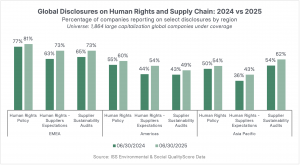Why Human Rights Are Now a Business Imperative: Global Trends in Corporate Responsibility

Corporations face growing pressure to demonstrate respect for human rights across their operations, value chains, and within the communities they serve. Increasingly, this takes the form of public commitments articulated through formal human rights policies, often aligned with international standards such as the Universal Declaration of Human Rights and the UN Guiding Principles on Business and Human Rights. These policies signify a commitment extending beyond legal compliance, often encompassing principles of fair employment, safe working conditions, and the prohibition of exploitative practices like forced labor.
Protecting Human Rights Across the Value Chain
Safeguarding human rights is particularly challenging within global value chains, where companies often lack direct control and operate in regions with varying levels of regulatory oversight and enforcement. In response, robust supplier codes of conduct are becoming essential, outlining specific expectations and embedding human rights considerations into contractual agreements.
Supporting these policies and codes is the rising adoption of human rights due diligence processes—systematic assessments of risk and independent audits—to monitor supplier compliance. This proactive approach yields substantial benefits: mitigating operational risks, strengthening reputation, attracting investors, and ultimately, fostering long-term business sustainability. Companies are realizing that a genuine commitment to human rights isn’t simply about ethical responsibility; it’s about building a more resilient and responsible enterprise.
A Global Surge in Human Rights Disclosures
ISS-Corporate reviewed human rights disclosures from large-cap companies (market capitalization exceeding $10 billion) to identify global trends in practices and reporting. Comparing disclosures as of June 30, 2025 to those of June 30, 2024, the analysis revealed a significant increase in human rights reporting across all regions. More companies are formalizing commitments to human rights and extending these commitments to their suppliers through dedicated policies. Additionally, there’s a growing trend of companies disclosing supplier audits that incorporate social and human rights considerations.
EMEA-based companies (primarily European firms) led in disclosure rates, with 81% reporting a human rights policy in 2025 (up from 77% in 2024) and 73% establishing formal human rights expectations for suppliers and conducting related audits. In the Americas, 60% of companies disclosed formal human rights commitments in 2025 (compared to 55% in 2024); supplier expectations increased substantially (from 44% to 54%), and 49% conducted supplier audits. Disclosure of human rights policies also improved in the Asia-Pacific region year-over-year. Notably, in Asia-Pacific, the percentage of companies conducting supplier audits exceeded those with disclosed human rights policies. This trend suggests that supplier due diligence practices may be more widespread than formal policy disclosures indicate.

Significant Momentum Across Industries
Reviewing data from the same universe of 1,864 global large-cap companies by sector reveals that human rights commitments and due diligence practices are increasingly becoming standard across all industries. This trend is particularly pronounced when focusing on formal commitments regarding supplier expectations related to human rights. Sectors with complex supply chains – Information Technology, Consumer Staples, Energy, and Materials – demonstrate higher disclosure rates than sectors with less supply chain exposure, such as Financials and Real Estate. Despite these differences, several sectors saw double-digit improvements in disclosure. For instance, Real Estate firms increased supplier human rights commitments from 38% in 2024 to 49% in 2025, while Health Care rose dramatically from 38% to 54%. Consumer Staples experienced one of the largest year-on-year gains, increasing from 50% to 64%.

Building Resilience Through Responsible Practices
Despite ongoing regulatory uncertainty and political complexities, this analysis confirms that companies are moving beyond compliance to proactively integrate human rights into their core business strategies. The significant increase in disclosures, coupled with a growing focus on supply chain due diligence, reflects a clear market shift towards prioritizing operational resilience and responsible business conduct. This trend points to a future where enhanced reporting and robust practices are not merely aspirations, but expectations for sustainable value creation.
Climate Action 100+: Trends and Expectations for 2026
EU Sustainability Rules Reset: What the 2026 Changes Mean
Science-Based Targets: Evolving Standards and Global Adoption
Latin America’s Sustainability Reporting Gains Momentum
Rare Earth Minerals: The Hidden Backbone of the Energy Transition
California Climate Laws Update: CARB Workshop and SB 261 Pause
Energy Management Systems: Global Trends and Best Practices
2025 Sustainability Reporting: Global Trends in Framework Adoption
Getting Materiality Right: Challenges, Risks, and Best Practices
Spain Introduces Mandatory Climate Disclosure

